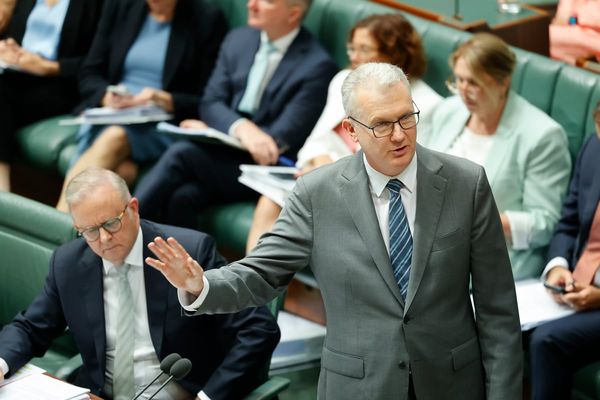John Howard has declared he “always had trouble” with the concept of multiculturalism, because immigrants should be expected to “adopt the values and practices” of the country they move to.
The former Liberal prime minister made the comments at the inaugural conference of new right-wing political forum the Alliance for Responsible Citizenship (Arc) on Wednesday in London.
“Multiculturalism is a concept that I’ve always had trouble with. I take the view that if people want to emigrate to a country, then they adopt the values and practices of that country,” Howard told Arc.
“And in return they’re entitled to have the host citizenry respect their culture without trying to create some kind of federation of tribes and culture – you get into terrible trouble with that.”
Howard, the former deputy prime minister John Anderson, and the shadow minister for Indigenous Australians, Jacinta Nampijinpa Price, have all used contributions to the conference to argue the no vote in the voice referendum was a vote for “unity”.
Critics including the former Labor prime minister Paul Keating have accused Howard and other reactionary conservatives of “outrageously and wilfully misinterpreting” the referendum result in an attempt to return to “the great assimilation project”.
Howard said during his political career at “a lot of local events, particularly in the bush” he met a lot of people who say “we came to this wonderful country because you were free, you were kind, you were generous”.
“And – isn’t that terrific? Do you really have to redefine that relationship?
“I think one of the problems with multiculturalism is we try too hard to institutionalise differences, rather than celebrate what we have in [common].”
Howard was the Australian prime minister from 1996 – elected in a campaign featuring a slogan promising he would govern “for all of us, not just for some” – until 2007, when he lost the election to Labor’s Kevin Rudd, including losing his own seat of Bennelong.
Howard’s time in office was marked by hard-line policies against asylum seekers attempting to come to Australia by boat at the same time as Australia experienced a boom in migration that underpinned its economic success.
When Pauline Hanson, a former Liberal, was elected to the lower house and formed the reactionary One Nation party, Howard responded by adopting some of her anti-Asian rhetoric including his suggestion that Asian migration should be “slowed down a little, so the capacity of the community to absorb [was] greater”.
In addition to slashing multicultural funding from the budget, Howard instituted Harmony Day instead of observing the UN’s international day for the elimination of racial discrimination.
At Arc, Howard described the voice no vote in excess of 60% as “a stonking endorsement of how united we are”.
“We don’t want separation based on race or background, we want unity.”
The voice would have recognised Indigenous Australians in the constitution, as Howard once attempted with a lengthy symbolic preamble that also proposed to recognise the “nation-building contribution of generations of immigrants”.
Unlike the failed 1999 referendum, the 2023 referendum also proposed an Indigenous advisory body to make representations to parliament and executive government.

Ahead of the vote Price, a leading no campaigner, stoked controversy with comments claiming there were no lasting negative impacts of colonisation, which the minister for Indigenous Australians, Linda Burney, said were “simply wrong” and had left Indigenous people “distressed” and “disgusted”.
On Tuesday Price told Arc the vote had “emboldened everyday Australians to believe that it is perfectly OK to be who you are, to be proud of who you are as an individual”.
Price claimed the proposed voice “sought to divide us along the lines of race”, repeating a false slogan of the campaign that ignored the reality that the criterion to vote for and be represented by the voice is Indigeneity, not race.
She claimed the voice sent the message that “it was the responsibility of white Australia to empower [Indigenous Australians] through our constitution”.
“The way forward from here is no more separatism, no more dividing us along the lines of race, no more political correctness, no more identity politics.
“We don’t need another to empower us. We can do that ourselves, and we can do it very well.”
The voice was one limb of the Uluru statement from the heart, which also calls for truth-telling and treaty-making, which is founded on the fact sovereignty of Indigenous nations has never been ceded.
Since the referendum defeat, Keating has argued that “Indigenous Australians never needed us to recognise them”.
“They should have been fighting for the treaty, the actual issue at hand, not the legal avenues by which they might provide advice,” he told Guardian Australia.
On Monday, Anderson falsely claimed that “every elite grouping in the country” including “90% of the media” had advocated for a yes vote in the referendum.
Addressing the audience assembled by Canadian psychologist Jordan Peterson and backed by a pro-Brexit hedge fund billionaire and a Dubai-based investment group, Anderson decried the influence of “cultural elites”.
Despite the fact that 37 of 45 proposed constitutional alterations have been rejected throughout Australian history, Anderson claimed the voice result was “civilisational moment”.
Anthony Albanese has repeatedly said that he will respect the outcome of the referendum, and he won’t put a national Indigenous voice in the constitution or in legislation.
Some other options for closing the gap and reconciliation – such as local and regional voices – have bipartisan support from the Coalition, which advocated a no vote.







